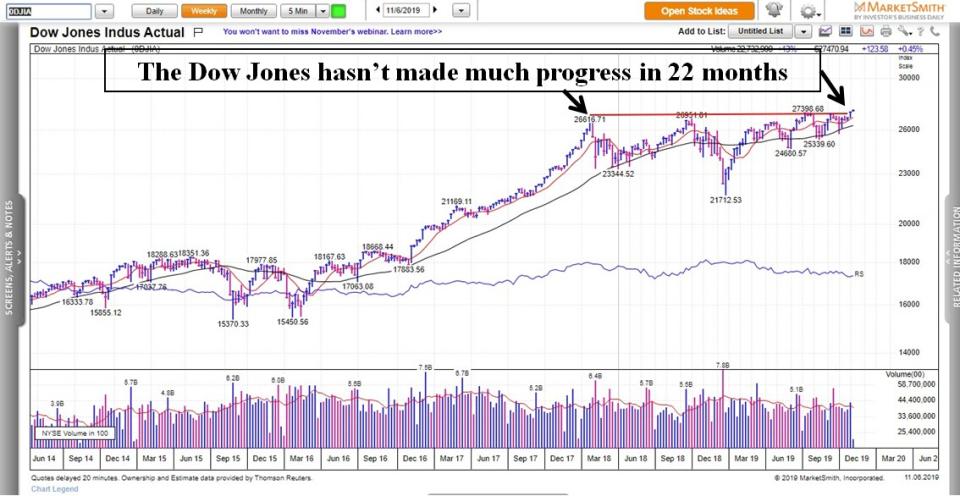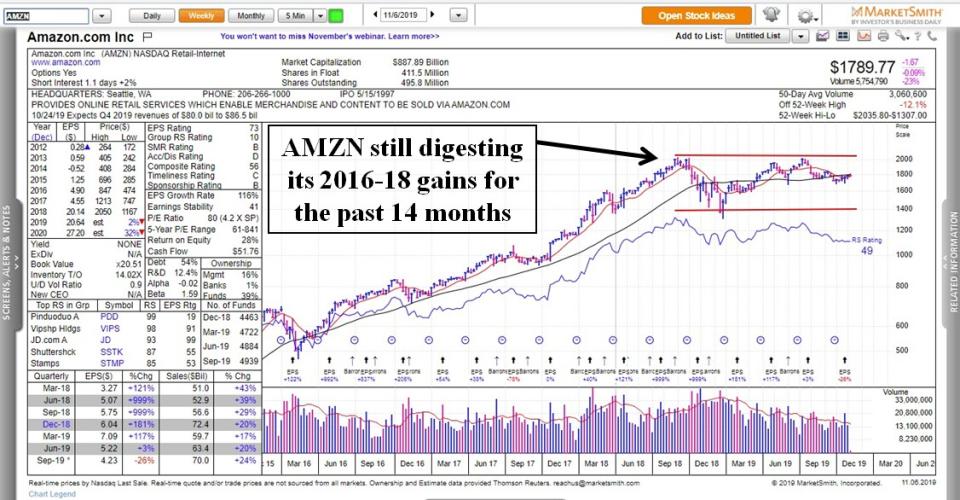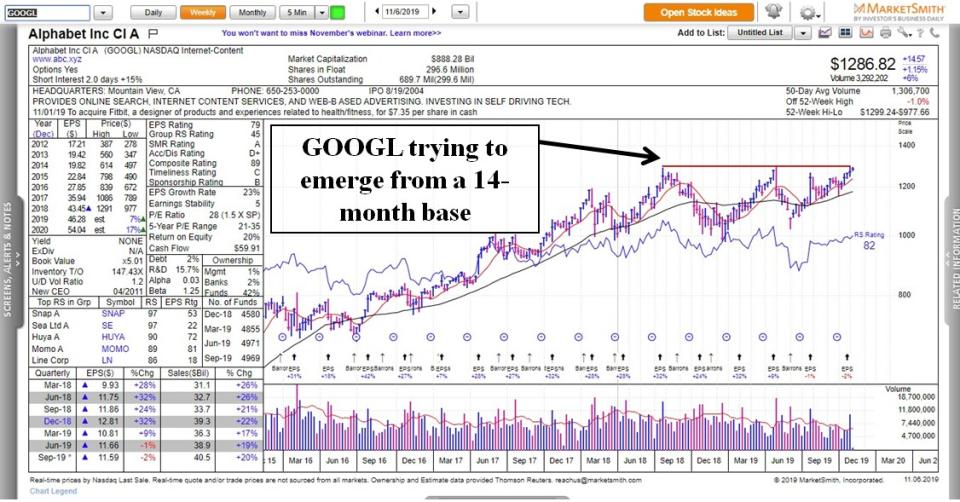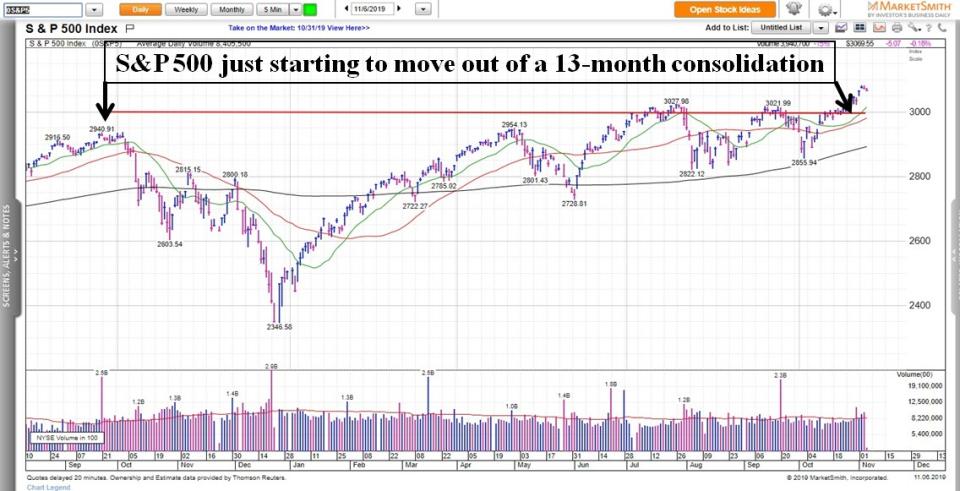Why the Dow will hit 30K before the next election

There is non-stop talk in the financial media about this “10-year bull market.” This narrative bothers me because 1) It is incorrect and 2) It is keeping so many people out of the market by making them think it will end any day now. I’m not saying people should be fully invested right now, but I am blown away by the number of potential investors I speak to that hold 100% cash and are brainwashed that a crash is coming very soon. Let’s look at the facts.
While I agree we’ve had a 10-year economic recovery, we’ve still seen three bear markets in the past 10 years within this overall secular bull. In 2011, the S&P 500 was down -21.6% on an intraday basis. Apparently someone made up a rule that it has to be down -20% on a closing basis to be considered a bear market. Therefore, the -19.4% closing decline did not meet this stupid definition. Did anyone ever think that maybe the algos know this definition and did this on purpose to mess with people? Just a thought.
Second, from mid-2015 to mid-2016, although the S&P only corrected -14.2%, the majority of stocks got decimated beneath the surface. Energy stocks corrected -50%, Biotech -40%, Financials -25%, and the Small and Mid Cap averages were down -27%. Also, some of the best money managers in the business were down over -20% that year. That doesn’t sound like a bull market to me.
Finally, in Q4 of 2018, the S&P was down over -20% on an intraday basis but “only” -19.8% on a closing basis. Some people don’t call it a bear market because it was only 3 months long, but keep in mind not every bear has to be like 2008-2009. The average bear market lasts 6 to 9 months with a correction of -27%. Some are shorter and some are longer but each one does not have to be a complete prolonged disaster.
The other thing many market participants fail to realize is that we have practically gone nowhere for 13 months on the S&P 500 and Nasdaq Composite, and the Dow Jones has barely made progress over the past 21 months. In addition, many of the large cap stocks (such as Google, Amazon, Intuitive Surgical, Booking Holdings, and JPMorgan) have been consolidating for the past 1 to 2 years. The charts below show some of these examples. (Charts are provided by MarketSmith.)



Outlook Going Forward
Earlier this year, when the Dow was around 26,800, I made a call for Dow 30,000 before the next presidential election. I am sticking to this call for the following reasons: Technicals, Fundamentals, Interest Rates and Sentiment.
Technicals – The big institutions control the market and they consistently support it at key technical levels. Of course we will have pullbacks and minor corrections along the way, but they will continue to get bought up because we are in an equity-friendly environment. I’ve been talking for a while about the market’s resiliency. It goes down but it doesn’t seem to stay down for long, especially considering all the bad news that’s been thrown at it. Imagine if we actually see some positive news? President Trump needs a China deal finalized and a strong market to get re-elected and I think he will do everything in his power to accomplish this.
Fundamentals – According to FactSet, the S&P 500 is reporting a year over year earnings decline of -2.7% for Q3 2019 and is projected to report a (Y/Y) decline in Q4 2019. This would represent four straight quarters of (Y/Y) earnings decline for the index. While you might think this is a negative headline, keep in mind the market is a discounting mechanism and trades on what will happen 6 to 12 months from now. It’s possible that we are experiencing a similar scenario to 2015-2016, where we had an earnings recession without the overall economy going into a recession. The market could be factoring in a China trade deal that would lead to an uptick in future earnings. Also, this 10-year economic expansion has never been in an explosive growth stage. It’s possible that this slow and steady GDP growth of 1.5%-2.5% per year will continue for a while.
Interest Rates – There’s an old expression on Wall Street that says “Don’t Fight the Fed!” Right now, you are not just fighting the Fed, you are fighting accommodative central banks all over the world. According to Callum Thomas at TopDown Charts, “The Federal Reserve is doing Quantitative Easing Lite, the European Central Bank is restarting QE, and there have been a net 47 rate cuts globally YTD (vs. a net 41 hikes in 2018). Like it or not, this global policy pivot is a big tailwind for risk assets.” Even if the Federal Reserve doesn’t perform further rate cuts over the near-term, Fed Chair Powell said in his last press conference that they would not return to raising rates until they see a “really significant” rise in inflation. In other words, if conditions remain where they are now, rates could remain low for a long time. As I said, good luck fighting all of this.
Sentiment – Short term, the market can experience brief bouts of euphoria but the second it starts to decline, sentiment usually spikes to extreme bearish measures and many call for the end of the world. This “one foot out the door” mentality helps to keep things propped up because the market tends to fool the majority. I’m not only amazed at how many people are horrified of a crash, but also fascinated with why so many are bearish with the market at all-time highs? My guess is people: 1) Have not participated in this rally because anyone making money is not complaining. 2) Keep blaming the Fed and complain that this will end badly. 3) Listen to the news too much (which tends to be negative) rather than paying attention to price action which is very strong and 4) Over-think things by being macro economists and focusing on what could go wrong. Whatever the reason, this continues to be the most hated bull market of all-time and this negative sentiment won’t end any time soon.
Overall, we are in an equity-friendly environment because the economy is growing, the consumer is strong, and the global central banks are on the market’s side. Whether or not you agree with what the central banks are doing doesn’t matter. I’m more in favor of taking advantage of it while things last, which could be much longer than most expect. I stick to my call that the Dow Jones will hit 30,000 before the next election. As long as the Fed and the big institutions continue to support this market, I will continue to stick to this strong uptrend. Bottom line: Don’t fight the Fed and don’t fight the big institutions!
I can be reached at: [email protected]
Follow Yahoo Finance on Twitter, Facebook, Instagram, Flipboard, SmartNews, LinkedIn, YouTube, and reddit.
Read more:
Why the market will head higher into year end
The single biggest reason the market dropped so hard last year — interest rates
The first sign to look out for to tell if the market or a stock is healthy
Disclaimer: This information is issued solely for informational and educational purposes and does not constitute an offer to sell or a solicitation of an offer to buy securities. None of the information contained on this site constitutes a recommendation that any particular security, portfolio of securities, transaction, or investment strategy is suitable for any specific person. From time to time, the content creator or its affiliates may hold positions or other interests in securities mentioned on this site. The stocks presented are not to be considered a recommendation to buy any stock. This material does not take into account your particular investment objectives. Investors should consult their own financial or investment adviser before trading or acting upon any information provided. Past performance is not indicative of future results.
